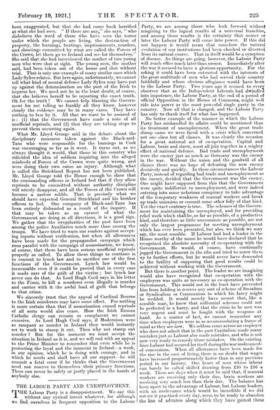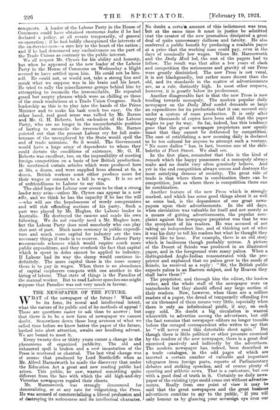THE LABOUR PARTY AND UNEMPLOYMENT.
THE Labour Party is a disappointment. We say this without any cynical intent whatever, for although we fwd. ourselves in frequent opposition to the Labour Party, we arc among those who look forward without misgiving to the logical results of a universal franchise, and among those results is the certainty that sooner or later the Labour Party will come into power. If this did not happen it would mean that somehow the natural evolution of our institutions had been checked or diverted, from its natural course. That in itself would be a symptom of disease. As things arc going, however, the Labour Party will reach office much later than sooner. Immediately after the it could seemed to have a glorious opportunity. For the asking t could have been entrusted with the interests of the great multitude of men who had served their country faithfully and whose obvious allegiance would have been to the Labour Party. Two years ago it seemed to every observer that as the Independent Liberals had dwindled into impotence, the Labour Party, at the end of a period of official Opposition in the House of Commons, might well ride into power as the most powerful single party in the country. Now all that is changed, and the Labour Party has only to thank itself for what has happened.
No better example of the manner in which the Labour Party has mishandled its affairs could be mentioned than its treatment of unemployment. When the great trade slump came we were faced with a crisis which concerned not one class but all classes. It was clearly the occasion for a great national act of co-operation. Capital and Labour, brain and sinew, must all join together in a mighty effort of national defence. Bad trade and unemployment were the enemy just as much as Germany was the enemy in the war. Without the union and the goodwill of all classes there was no hope of defeating the new enemy decisively and quickly. In these circumstances the Labour Party, instead of regarding bad trade and unemployment as the enemy, decided that the Government was the enemy. One might have supposed from this that the Government were quite indifferent to unemployment, and were indeed entering into some nefarious conspiracy to take advantage of the temporary weakness of manual workers and break up trade unionism or commit some other folly of that kind. Yet the exact contrary is true. The schemes of the Govern- ment for maintaining the unemployed, and for providing relief work which shall be, so far as possible, of a productive kind, and therefore as little uneconomic as possible, are not only the largest programme for meeting unemployment which has ever been presented, but also, we think we may say, the most sensible. If Labour had had a leader in the House worthy of the name he would have declared that he recognized the absolute necessity of co-operating with the Government. He would, of course, have continually jogged the Government in the ribs and tried to screw them up to further efforts, but he would never have descended to the futility of supposing that good results could be achieved without working with the Government. But there is another point. The leader we are imagining would also have recognized that co-operation with the employers was quite as necessary as co-operation with the Government, This would not in the least have prevented him from holding in reserve any sort of scheme of Socialism or Syndicalism or Communism to which his fancy might be wedded. It would merely have meant that, like a sensible man, he knew that millennial schemes could not be perfected in a hurry, and that the crisis to be met was very urgent and must be fought with the weapons at hand. As a matter of fact, we cannot remember any time when employers were in so accommodating a frame of mind as they are now. We seldom come across an employer who does not admit that in the past Capitalism made many mistakes just as Labour also made mistakes, and who is not now very ready to remedy those mistakes. On the existing lines Labour had secured for itself duringthewar undreamed- of concessions. When all allowances have been made for the rise in the cost of living, there is no doubt that wages have increased proportionately faster than in any previous period in our history. One hears of men whose labour can barely be called skilled drawing from £10 to £16 a week. These are days when it must be said that, if manual workers are receiving only their due, brain workers are receiving very much less than their due. The balance has been upset to the advantage of Labour, but Labour leaders, with an irrelevance which would be incredible if we did not see it practised every day, seem to be ready to- abandon the line of advance along which they have gained these conquests. A leader of the Labour Party in the House of i Commons could have obtained enormous kudos if he had declared a policy, at all events temporarily, of general co-operation ; if he had boldly championed the interests of the ex-Service men—a sure key to the heart of the nation ; and if he had denounced any exclusiveness on the part of the Trade Unions as contrary to the public interest. We all respect Mr. Clynes for his ability and honesty, but when he appeared as the new leader of the Labour Party in the House of Commons on Wednesday a blight seemed to have settled upon him. He could not be him- self. He could not, or would not, take a strong line and speak what we suppose was in his brain and his heart. He tried to rally the miscellaneous groups behind him by attempting to reconcile the irreconcilable. He repeated grand but empty phrases which were as chilling as those of the stock resolutions at a Trade Union Congress. Such leadership as this is to -play into the hands of the Prime Minister and to make his task much too easy. On the other hand, real good sense was talked by Mr. Barnes and Mr. G. H. Roberts, both ex-leaders of the Labour Party, who are no longer in the uncomfortable position of having to reconcile the irreconcilable. Mr. Barnes pointed out that the present Labour cry for full main- tenance of the unemployed by the State would spell the end of trade unionism. So it would. The Government would have a huge army of dependents to whom they could dictate the conditions of existence. Mr. G. H. Roberts was excellent, too, on the impossibility of meeting foreign competition on a basis of low British production. He mentioned certain articles which were produced here at 36s. a dozen, and were supplied from abroad at 6s. a dozen. British workers must either produce more for their wages or consent to a fall in wages. It is no act of unfriendliness to Labour to say this.
The chief hope for Labour now seems to be that a strong leader may arise—unless Mr. Clynes can appear in a new role, and we think he has the capacity if he has the will —who will see the hopelessness of wordy compromises and will risk offending sections of his party. Such a part was played by Mr. Hughes, the Labour leader in Australia. He destroyed the caucus and made his own following. We do not exactly need a Mr. Hughes here, but the Labour Party does need somebody who can play that sort of part. Much more economy in public expendi- ture and much more capital for industry are the two necessary things if trade is to recover. The Labour Party recommends schemes which would require much more public expenditure, and they overlook the fact that capital which is spent in doles cannot be applied to industry. If Labour had its way the slump would continue in- definitely. The more capital there is the more money there is to pay in wages. When there is an abundance of capital employers compete with one another in the hiring of labour. That state of things is the Paradise of the manual worker. But to read Labour speeches one might suppose that Paradise was not very much in favour.



































 Previous page
Previous page